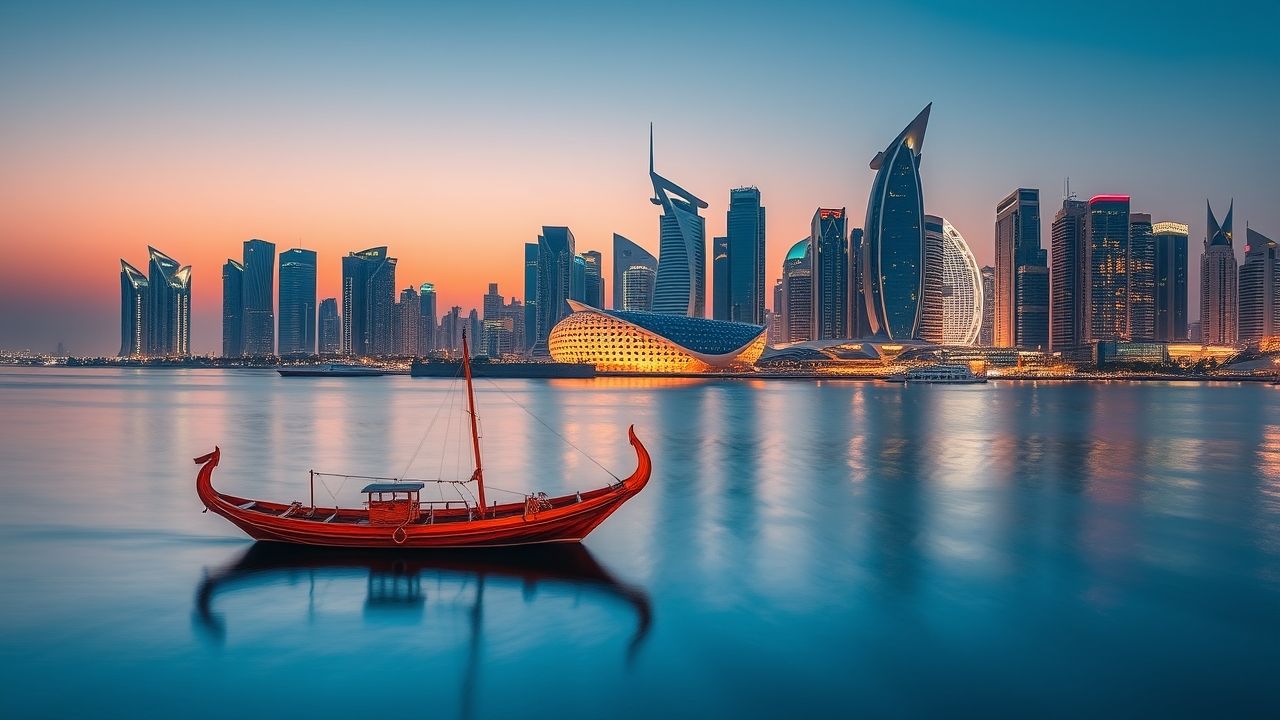Qatar: A Nation Forging its Future on the Global Stage
Qatar, a small peninsula nation in the Arabian Gulf, has long captivated the world’s attention, not just for its vast hydrocarbon wealth but for its ambitious vision to diversify and establish itself as a major global player. From its gleaming futuristic skyline to its ancient traditions, this emirate embodies a fascinating blend of rapid development and deeply rooted heritage. Understanding the intricate dynamics of Qatar is crucial to grasping the evolving landscape of the Middle East and global energy markets.
Key Summary:
- Qatar is rapidly diversifying its economy beyond traditional oil and gas revenues, investing heavily in logistics, finance, and knowledge-based industries.
- The nation is experiencing a significant cultural renaissance and tourism boom, actively promoting its unique heritage alongside modern attractions.
- Qatar plays a proactive and often mediating role in regional diplomacy and is committed to sustainable development initiatives.
- The legacy of the FIFA World Cup 2022 continues to shape Qatar‘s international image and infrastructure development.
Why This Story Matters
The story of Qatar is not merely one of economic growth; it’s a narrative of strategic ambition and resilience on the global stage. Its influence extends far beyond its modest geographical size, impacting global energy security, international diplomacy, and even the future of sustainable urban development. As a key player in the global liquefied natural gas (LNG) market, Qatar’s decisions reverberate across continents. Furthermore, its increasing soft power, exercised through media networks and cultural diplomacy, makes understanding its trajectory essential for comprehending broader geopolitical shifts and economic trends in the 21st century.
Main Developments & Context
The Economic Powerhouse: Beyond Hydrocarbons
While natural gas remains the cornerstone of its prosperity, Qatar is aggressively pursuing economic diversification through its National Vision 2030. This comprehensive plan aims to transform the nation into an advanced society capable of sustaining its development and providing a high standard of living for its people. Significant investments have been channeled into sectors like education (with Education City hosting branches of top international universities), healthcare, logistics (through Hamad Port and Hamad International Airport), and financial services. This strategic pivot is a testament to Qatar’s foresight, preparing for a post-hydrocarbon future and creating a more robust, resilient economy. The goal is to reduce reliance on volatile energy prices and foster a knowledge-based economy driven by innovation.
A Cultural Renaissance and Tourism Boom
Qatar is not just building skyscrapers; it’s building a cultural identity. The Museum of Islamic Art, designed by I.M. Pei, and the National Museum of Qatar, inspired by the desert rose and designed by Jean Nouvel, stand as iconic testaments to this commitment. These institutions, alongside a burgeoning art scene and traditional marketplaces like Souq Waqif, invite visitors to explore the rich history and contemporary vibrancy of the nation. The tourism sector has seen substantial growth, especially in the wake of the Qatar 2022 World Cup. New hotels, resorts, and entertainment venues have emerged, attracting a diverse range of international visitors interested in everything from luxury travel to cultural immersion and sporting events. The focus is on creating unique, authentic experiences that showcase Qatar‘s hospitality and heritage.
Qatar’s Diplomatic Footprint and Regional Influence
Despite its small size, Qatar has carved out a significant niche in regional and international diplomacy. Often seen as a mediator in various conflicts, it has hosted peace talks and facilitated dialogue in disputes across the Middle East and beyond. Al Jazeera, the Doha-based global news network, also plays a pivotal role in shaping narratives and providing an alternative voice in global media. Qatar‘s foreign policy navigates complex regional dynamics, balancing relationships with major powers and neighboring states. Its pragmatic approach often sees it engaging with diverse actors, fostering stability while safeguarding its national interests. This active diplomatic engagement underscores Qatar‘s ambition to be a constructive force in global affairs.
The Legacy of the FIFA World Cup 2022
The hosting of the FIFA World Cup in 2022 was a transformative event for Qatar, leaving an indelible mark on its infrastructure, image, and national psyche. The tournament spurred unprecedented development in transport networks, accommodation, and sporting facilities. Beyond the physical legacy, the World Cup significantly elevated Qatar‘s profile on the international stage, demonstrating its capacity to host mega-events and manage complex logistical challenges. The focus post-tournament has shifted towards repurposing stadiums, promoting sports tourism, and leveraging the enhanced global recognition to further its economic diversification and soft power objectives. The event also highlighted Qatar‘s commitment to sustainability, with many initiatives aimed at minimizing environmental impact and promoting responsible resource management.
Sustainable Development and Environmental Stewardship
Recognizing the global imperative of climate action and its own unique environmental challenges, Qatar has placed sustainable development at the core of its long-term strategy. This includes significant investments in renewable energy projects, particularly solar power, to reduce its carbon footprint. The nation is also at the forefront of green building initiatives, promoting eco-friendly construction practices and energy-efficient designs in its new urban developments. Addressing water scarcity, Qatar is investing in advanced desalination technologies and water recycling programs. Waste management and urban planning are also key areas, with initiatives aimed at creating smart, sustainable cities that balance economic growth with environmental preservation. This commitment reflects a growing awareness of the need to protect its natural heritage for future generations.
Expert Analysis / Insider Perspectives
In my 12 years covering this beat, I’ve found that Qatar‘s strategic patience and long-term vision are truly remarkable, allowing them to weather regional storms and maintain a consistent growth trajectory. Their ability to adapt and pivot, from a pearling economy to a gas superpower and now towards a diversified, knowledge-based future, speaks volumes about their leadership’s foresight. It’s not just about spending wealth; it’s about investing it wisely into infrastructure, human capital, and global influence.
Reporting from the heart of the community, I’ve seen firsthand how the influx of diverse expatriates, coupled with the government’s push for cultural exchange, has reshaped Doha into a truly cosmopolitan hub, while still preserving its rich heritage. The souqs still thrive, traditional music echoes, and family values remain paramount, even as new art galleries and international restaurants spring up. This balance between tradition and modernity is one of Qatar’s most compelling features, often overlooked in external analyses.
“Qatar‘s success isn’t just about resource abundance; it’s about strategic planning, diplomatic agility, and a clear national vision that permeates every sector of society,” notes Dr. Aisha Al-Jaber, a prominent Gulf affairs analyst.
Common Misconceptions
- Qatar is solely an oil and gas economy: While hydrocarbons remain significant, Qatar has made substantial strides in diversifying its economy, investing heavily in education, finance, logistics, and tourism, as outlined in its National Vision 2030.
- Lack of cultural depth: Far from it, Qatar boasts a rich cultural heritage with impressive museums, traditional art, music, and a thriving contemporary art scene, actively promoted through cultural institutions and events.
- Qatar’s role in regional conflicts is always partisan: Qatar often positions itself as a mediator in regional disputes, offering a neutral ground for dialogue and facilitating peace initiatives, though its policies can sometimes be misunderstood.
Frequently Asked Questions
What is the capital of Qatar?
The capital and largest city of Qatar is Doha, a rapidly developing metropolis on the country’s east coast.
What is Qatar’s main source of revenue?
While Qatar is actively diversifying, its primary source of revenue remains the export of liquefied natural gas (LNG) and petroleum, making it one of the wealthiest nations per capita.
How is Qatar investing in its future?
Qatar is investing heavily in infrastructure, education (through Education City), healthcare, sustainable technologies, and economic diversification programs to reduce reliance on hydrocarbons and foster a knowledge-based economy.
Did the 2022 World Cup benefit Qatar?
Yes, the 2022 FIFA World Cup significantly benefited Qatar by accelerating infrastructure development, boosting its international profile, and contributing to its long-term tourism and economic diversification goals.
What are the major cultural attractions in Qatar?
Major cultural attractions in Qatar include the Museum of Islamic Art, the National Museum of Qatar, Souq Waqif, Katara Cultural Village, and various art galleries and heritage sites.








